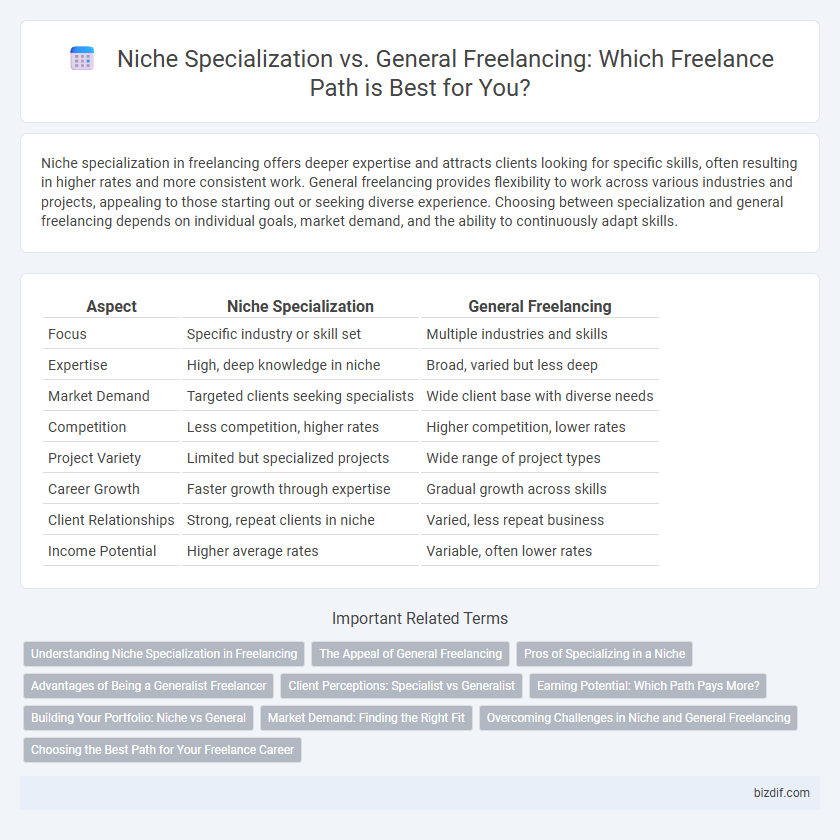Niche specialization in freelancing offers deeper expertise and attracts clients looking for specific skills, often resulting in higher rates and more consistent work. General freelancing provides flexibility to work across various industries and projects, appealing to those starting out or seeking diverse experience. Choosing between specialization and general freelancing depends on individual goals, market demand, and the ability to continuously adapt skills.
Table of Comparison
| Aspect | Niche Specialization | General Freelancing |
|---|---|---|
| Focus | Specific industry or skill set | Multiple industries and skills |
| Expertise | High, deep knowledge in niche | Broad, varied but less deep |
| Market Demand | Targeted clients seeking specialists | Wide client base with diverse needs |
| Competition | Less competition, higher rates | Higher competition, lower rates |
| Project Variety | Limited but specialized projects | Wide range of project types |
| Career Growth | Faster growth through expertise | Gradual growth across skills |
| Client Relationships | Strong, repeat clients in niche | Varied, less repeat business |
| Income Potential | Higher average rates | Variable, often lower rates |
Understanding Niche Specialization in Freelancing
Niche specialization in freelancing involves focusing on a specific industry or skill set, enabling freelancers to develop deep expertise and attract high-quality clients seeking tailored solutions. This targeted approach enhances the freelancer's marketability and allows for premium pricing due to the specialized knowledge and experience offered. By understanding the unique challenges and trends within a niche, freelancers can deliver more efficient and impactful services compared to general freelancers who offer a broad range of skills.
The Appeal of General Freelancing
General freelancing offers a flexible approach by allowing professionals to work across multiple industries and skill sets, maximizing the variety of job opportunities available. This broad market appeal attracts clients seeking versatile freelancers capable of handling diverse project types, increasing overall earning potential. Freelancers benefit from adapting quickly to changing demand and expanding their portfolio without being confined to a single niche.
Pros of Specializing in a Niche
Specializing in a niche allows freelancers to position themselves as experts, attracting higher-quality clients willing to pay premium rates for specialized skills. It enhances marketability by reducing competition within crowded fields and enables more targeted marketing strategies that increase client acquisition efficiency. Mastery of specific industry jargon and trends builds stronger trust and long-term relationships with clients, fostering repeat business and referrals.
Advantages of Being a Generalist Freelancer
Generalist freelancers benefit from a diverse skill set that allows them to tackle a wide range of projects across multiple industries, increasing their marketability and client base. Their versatility enables quick adaptation to evolving client needs and emerging trends, fostering consistent work opportunities. Generalists also experience less risk by not relying on a single niche, ensuring steadier income even during market fluctuations.
Client Perceptions: Specialist vs Generalist
Clients often perceive niche specialists as experts with deep knowledge, leading to higher trust and willingness to pay premium rates. General freelancers attract a broader range of clients due to versatility but may face skepticism about expertise in specific fields. Specialization enhances credibility and positioning, while general freelancing offers flexibility but potentially lower client confidence.
Earning Potential: Which Path Pays More?
Niche specialization in freelancing often leads to higher earning potential due to targeted expertise and reduced competition, attracting premium clients willing to pay more for specialized skills. General freelancing offers diverse opportunities but typically results in lower rates because of broader market competition and less perceived expertise. Data shows specialized freelancers can earn 20-50% more on average than generalists, highlighting the financial advantage of niche-focused services.
Building Your Portfolio: Niche vs General
Building a portfolio with niche specialization allows freelancers to showcase targeted expertise and attract clients seeking specific skills, enhancing credibility within that market. General freelancing portfolios demonstrate versatility across various industries, appealing to a broader range of clients but potentially diluting perceived mastery. Data shows niche portfolios often lead to higher client retention and premium rates due to focused value propositions.
Market Demand: Finding the Right Fit
Niche specialization in freelancing targets specific industries or skills, attracting clients looking for expert knowledge and often commanding higher rates due to specialized demand. General freelancing offers broader service options, appealing to diverse clients but facing increased competition and price sensitivity. Analyzing market demand involves researching industry trends and client needs to identify whether a focused or versatile skill set aligns better with current freelance opportunities.
Overcoming Challenges in Niche and General Freelancing
Freelancers specializing in a niche often face challenges such as limited client volume and the need to constantly update specific industry knowledge, while general freelancers must navigate broad competition and diverse skill demands. Building a strong portfolio tailored to a niche can overcome market saturation, whereas general freelancers benefit from versatility and continuous skill adaptation to appeal to varied clients. Effective time management and targeted marketing strategies are essential to surmount obstacles in both niche specialization and general freelancing.
Choosing the Best Path for Your Freelance Career
Niche specialization in freelancing enhances your marketability by positioning you as an expert in a specific field, leading to higher-paying opportunities and client trust. General freelancing offers flexibility and a broader range of projects, ideal for those exploring different skills or industries. Selecting the best path depends on career goals, skill set, and market demand, with specialized freelancers often seeing faster growth and consistent work.
Niche specialization vs General freelancing Infographic

 bizdif.com
bizdif.com